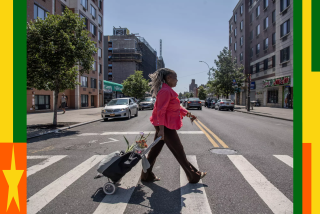In Norwalk, citizens speak but TV viewers don’t hear
Like most towns, Norwalk broadcasts its City Council meetings on its government access cable channel. But unlike most cities, Norwalk blacks out the portion of the meeting where residents step to the microphone and speak their mind. As soon as residents start taking turns sounding off on civic affairs, the cameras are shut down.
“We stop as soon as they get to oral communications,” said Sherian Mussegek, the city’s production supervisor. “That’s it. We’re off.”
Neither Mayor Cheri Kelley nor longtime City Manager Ernie Garcia returned calls or e-mails to explain why the council adopted the policy, but Vice Mayor Gordon Stefanhagen said, “It just went that way and we did it. I don’t know why.”
Though viewers may be denied the opportunity to witness the liveliest portion of most council meetings, 1st Amendment experts said the policy appears legal, as long as everyone is blacked out and it’s not just specific speakers being censored.
Still, public policy experts said they’d never heard of such a blackout rule.
“You’re kidding?” said former Santa Clara Mayor Judy Nadler, a senior fellow in government ethics at the Markula Center for Applied Ethics at Santa Clara University. “The idea of cutting off the public from access to what fellow citizens have on their mind is troubling. There’s no excuse for that.”
Said Bob Stern, president of the Center for Governmental Studies in Los Angeles: “Oh, my goodness. That’s a new one for me. How petty can you get?”
Stern said that during the cablecasts of Los Angeles City Council meetings, while it might appear as if most council members are not paying attention to the speakers, at least their comments are being broadcast.
Although it is rare for cities to black out comments from its citizens, several Southern California cities have at least considered it, usually because council members disliked the bashing they often received. The Garden Grove Council decided to black out the public comments portion 10 years ago but reinstated it a year later. Earlier proposals from council members in Pomona and Thousand Oaks were withdrawn because of the firestorm that ensued.
Meanwhile, in Carson, the Los Angeles County district attorney’s office is investigating whether the mayor is employing a form of censorship by using a mute button to silence community members and council members, a potential violation of the state open meetings law.
Jennifer Lentz Snyder, assistant head deputy of the D.A.’s Public Integrity Division, said the Norwalk policy did not appear to violate the Brown Act.
The Norwalk council approved the blackout policy in 2004, censoring what it calls “oral communications” from broadcasts of the City Council and planning commission.
“I feel it’s an opportunity for open communications and the video should roll,” said Jesse Luera, the only council member who voted against the policy.
During oral communications, members of the audience can speak for five minutes on anything to do with the city, the closest thing most cities have to a speakers’ corner. The freewheeling monologues can range from harsh criticism of city officials to announcing that the Girl Scouts are holding a pancake breakfast.
Those watching some cities’ council meetings at home can become so exercised about what they hear that they march into meetings to speak their minds wearing slippers and a coat over their nightclothes.
State law requires a city to offer the public a chance to speak out at council meetings, said JoAnne Speers, executive director of the Institute for Local Government in Sacramento.
Stern said he suspected that the Norwalk council’s reason for the blackout was “it didn’t want to give publicity to these gadflies.”
Two of Norwalk’s most prominent self-described gadflies agreed.
Jerry Ori, a management consultant, said Mayor Kelley told him that Ori would bring up issues at council meetings to which she had no answers when people later asked her about them.
Bob Hoskins said Ori’s criticism of a councilman’s use of his city credit card on a Palm Springs trip prompted the council to adopt the blackout.
“There are two gadflies these people don’t want to hear, don’t want to see, and they’re going to stifle them,” said Hoskins, a retired MTA clerk. “To me it’s a form a censorship.”
More to Read
Start your day right
Sign up for Essential California for news, features and recommendations from the L.A. Times and beyond in your inbox six days a week.
You may occasionally receive promotional content from the Los Angeles Times.







